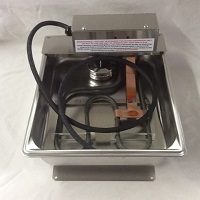
Michael Nunn is still searching for the perfect product improvement idea. But thanks to some help from CIRAS, Nunn now believes he’s on the correct path.
Nunn is the owner of Birmingham Manufacturing, a four-person company in Birmingham, Iowa, that makes condensated evaporating pans for use in commercial coolers. The pans, which contain a heating element and sit below refrigeration units, work to evaporate the water that drips from inside coolers.
Nunn approached CIRAS last fall seeking help in making his products more efficient.
“Appliance companies in general are being scrutinized more closely for their energy efficiency,” said CIRAS project manager John Roberts. “He wanted to be able to go to these companies and say, ‘Hey, we provide one of the most energy-efficient condensate pans.’”
Roberts and Iowa State University engineering student Jacob Meyer eventually walked the company through various possibilities for changing the design of the pans and/or the shape of the heating element to make certain that as little energy was wasted as possible. The most efficient suggestion involved moving from solid heating elements to flexible heating pads that would conform to the interior shape of the pan. Such a switch would mean more heat energy going directly into the water to be evaporated. It also would save Nunn’s customers money and make his products more appealing.But Nunn quickly was forced to back away from that idea when the flexible pad’s manufacturer balked at having the product perpetually submersed in water. Birmingham Manufacturing since has begun evaluating other possible options, but Nunn has yet to settle on any particular design.
As the search continues, Nunn remains confident that Birmingham Manufacturing has been revitalized by working with CIRAS engineers. Financial rewards will come eventually, he believes, because the company now is on a better path.
“We still got value out of the process,” Nunn said. “It just kind of re-awoke us to try new things more frequently, to get ourselves into a position where we can actively be searching for product improvements.”
“The best part we got out of it was a fresh perspective,” Nunn said. “Looking at it from the standpoint of a disconnected person, CIRAS was asking questions that we had quit asking years before. It was beneficial for us to get that new set of eyes and a fresh set of ideas.”
> For more information, contact John Roberts at jarobert@iastate.edu or 515-294-0932.
A version of this article was published in the Spring 2019 edition of CIRAS News. To read more of that edition or others, please explore elsewhere on our website.